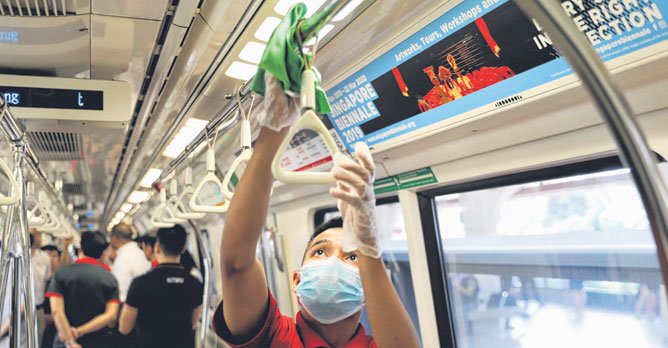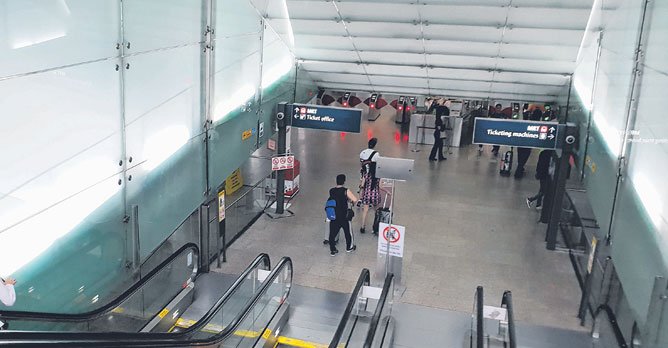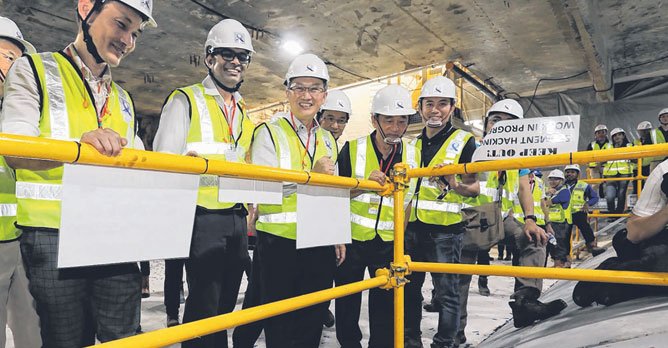No increase in public transport fares this year
05 Sep 2020|343 views
Public transport fares will not rise this year to help commuters amid the COVID-19 pandemic.
Under normal circumstances, fares could have increased by up to 4.4% based on the current fare review exercise formula, the Public Transport Council (PTC) said in its annual fare revision announcement on 4 September 2020.

Noting that the pandemic is an unprecedented crisis, PTC Chairman Richard Magnus said: "The council recognises the exceptional circumstances faced by Singaporeans, and has considered the impact on public transport commuters. The council has therefore decided not to adjust fares to ease the burden on commuters."
Up to two million Singaporeans will also continue to enjoy concessionary fares. Public transport fares rose by 7% last year - the maximum allowed under the formula for 2019. The figure had been the biggest percentage jump since 1998.
The decision to not raise fares this year comes amid mounting financial pressure on public transport operators, which have been hit hard by a fall in ridership without a corresponding fall in bus and train frequencies. Train operators SMRT Trains and SBS Transit had both applied for a fare increase of 4.4%, with both registering more than $10 million in losses in their last financial year even without taking into account the full impact of the COVID-19 pandemic.

Even after the lifting of the circuit breaker measures, ridership remains at about 60% of pre-COVID-19 levels. The PTC said: "With the impact of COVID-19, revenues have fallen further, and we expect government subsidies to be even higher this year."
The Government was expected to spend close to $1 billion to renew and upgrade rail operating assets, and another $1 billion to subsidise public bus services annually over the next five years. This translates into more than $1 in subsidies for every journey taken. Mr. Magnus said the difference between the fare revenue and the operating cost was one of the reasons taken into consideration by the council in not recommending a fare decrease.
Other factors included the continuation of the concession schemes, extension of the application period, public transport vouchers and the fact that the Government has announced financial support for Singaporeans through various support measures.
In response to questions from reporters about next year's review exercise, Mr. Magnus said the pandemic would likely lead to a fall in the core consumer price index, wage index and energy index - all factors that make up the fare adjustment formula. "I doubt very much that we will see a fare increase... a position not unlike this current year's position," said Mr Magnus.
Public transport ridership registered its 15th consecutive year of growth up till last year. The Land Transport Authority reported a record of 7,691,000 trips a day last year - a rise of 2% from the year before. Bus ridership grew by 1.5% to a daily average of 4,099,000, while train ridership grew by 2.6% to 3,592,000.
Public transport fares will not rise this year to help commuters amid the COVID-19 pandemic.
Under normal circumstances, fares could have increased by up to 4.4% based on the current fare review exercise formula, the Public Transport Council (PTC) said in its annual fare revision announcement on 4 September 2020.

Noting that the pandemic is an unprecedented crisis, PTC Chairman Richard Magnus said: "The council recognises the exceptional circumstances faced by Singaporeans, and has considered the impact on public transport commuters. The council has therefore decided not to adjust fares to ease the burden on commuters."
Up to two million Singaporeans will also continue to enjoy concessionary fares. Public transport fares rose by 7% last year - the maximum allowed under the formula for 2019. The figure had been the biggest percentage jump since 1998.
The decision to not raise fares this year comes amid mounting financial pressure on public transport operators, which have been hit hard by a fall in ridership without a corresponding fall in bus and train frequencies. Train operators SMRT Trains and SBS Transit had both applied for a fare increase of 4.4%, with both registering more than $10 million in losses in their last financial year even without taking into account the full impact of the COVID-19 pandemic.

Even after the lifting of the circuit breaker measures, ridership remains at about 60% of pre-COVID-19 levels. The PTC said: "With the impact of COVID-19, revenues have fallen further, and we expect government subsidies to be even higher this year."
The Government was expected to spend close to $1 billion to renew and upgrade rail operating assets, and another $1 billion to subsidise public bus services annually over the next five years. This translates into more than $1 in subsidies for every journey taken. Mr. Magnus said the difference between the fare revenue and the operating cost was one of the reasons taken into consideration by the council in not recommending a fare decrease.
Other factors included the continuation of the concession schemes, extension of the application period, public transport vouchers and the fact that the Government has announced financial support for Singaporeans through various support measures.
In response to questions from reporters about next year's review exercise, Mr. Magnus said the pandemic would likely lead to a fall in the core consumer price index, wage index and energy index - all factors that make up the fare adjustment formula. "I doubt very much that we will see a fare increase... a position not unlike this current year's position," said Mr Magnus.
Public transport ridership registered its 15th consecutive year of growth up till last year. The Land Transport Authority reported a record of 7,691,000 trips a day last year - a rise of 2% from the year before. Bus ridership grew by 1.5% to a daily average of 4,099,000, while train ridership grew by 2.6% to 3,592,000.
Latest COE Prices
August 2025 | 1st BIDDING
NEXT TENDER: 20 Aug 2025
CAT A$102,009
CAT B$123,498
CAT C$70,001
CAT E$122,334
View Full Results Thank You For Your Subscription.





















